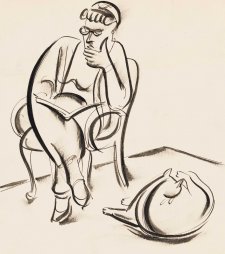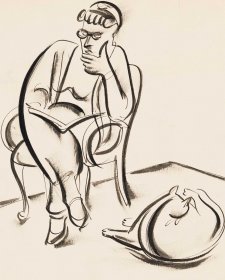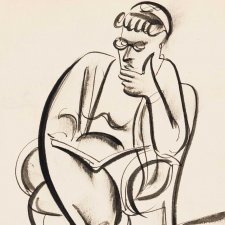Margel Hinder AM (née Harris) (1906-1995), sculptor, trained in Buffalo and Boston in the 1920s. In the early 1930s she married Australian Frank Hinder, who had gone to America to study art, and in 1933 both studied in New Mexico with Emil Bisttram. In 1934 they came to Australia, where he joined the ‘second-wave modern’ circle including Ralph Balson, Grace Crowley and Rah Fizelle who helped to introduce cubist, abstract and futurist art to Sydney. During the Second World War the couple lived in Canberra, working in the Department of Home Security (by that time, she had taken out Australian citizenship). They lived in Boldrewood Street, Turner, and worked at the Girls’ Grammar School. Until the 1940s Margel mostly worked in wood, but after the war, her metal constructions became central to the new sculpture movement. In 1953 she was one of a group of artists who won substantial runner-up prizes in the ‘Unknown Political Prisoner’ competition in London. Rounded wire revolving sculptures that she made in the 1950s evolved into a work for Canberra’s pioneering Monaro Mall in 1963. Her Free Standing Sculpture (1964) clings to the external wall of the Reserve Bank in Martin Place, Sydney; the Captain James Cook Memorial Fountain (1966) in copper, granite and bronze is in Newcastle’s Civic Park; the Sculptured Form (1972) is in Woden Town Square, Canberra. The NGV has her cedar Man with jackhammer from 1939. The wooden Mother and child from the same year, resonant of the work of Henry Moore and Jacob Epstein but informed by her vitalist philosophy, is a ‘collection highlight’ of the Art Gallery of New South Wales, which also holds a number of her lighter abstract works from later. The National Gallery of Australia has many drawings and watercolours that Frank Hinder made while the couple lived in Canberra, but only one work by Margel Hinder, a revolving construction from the late 1950s. The Bathurst Regional Gallery has many works by both. She won the Blake Prize for religious art in 1961. In 1973 the Newcastle City Gallery staged a large retrospective of the works of Frank and Margel Hinder; Renée Free’s book about the couple was published in 1980.







